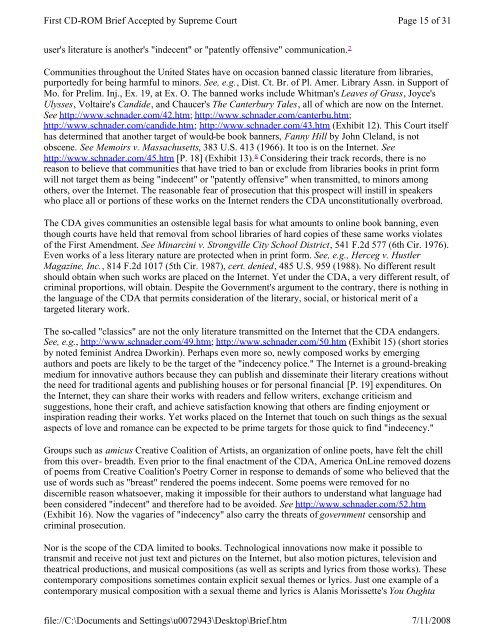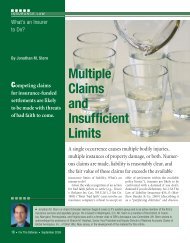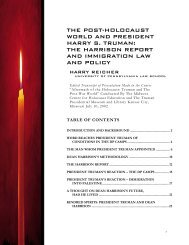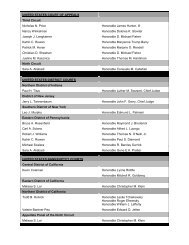Filed the first CD-ROM brief in the U.S. Supreme Court - Schnader ...
Filed the first CD-ROM brief in the U.S. Supreme Court - Schnader ...
Filed the first CD-ROM brief in the U.S. Supreme Court - Schnader ...
Create successful ePaper yourself
Turn your PDF publications into a flip-book with our unique Google optimized e-Paper software.
First <strong>CD</strong>-<strong>ROM</strong> Brief Accepted by <strong>Supreme</strong> <strong>Court</strong><br />
Page 15 of 31<br />
user's literature is ano<strong>the</strong>r's "<strong>in</strong>decent" or "patently offensive" communication. 7<br />
Communities throughout <strong>the</strong> United States have on occasion banned classic literature from libraries,<br />
purportedly for be<strong>in</strong>g harmful to m<strong>in</strong>ors. See, e.g., Dist. Ct. Br. of Pl. Amer. Library Assn. <strong>in</strong> Support of<br />
Mo. for Prelim. Inj., Ex. 19, at Ex. O. The banned works <strong>in</strong>clude Whitman's Leaves of Grass, Joyce's<br />
Ulysses, Voltaire's Candide, and Chaucer's The Canterbury Tales, all of which are now on <strong>the</strong> Internet.<br />
See http://www.schnader.com/42.htm; http://www.schnader.com/canterbu.htm;<br />
http://www.schnader.com/candide.htm; http://www.schnader.com/43.htm (Exhibit 12). This <strong>Court</strong> itself<br />
has determ<strong>in</strong>ed that ano<strong>the</strong>r target of would-be book banners, Fanny Hill by John Cleland, is not<br />
obscene. See Memoirs v. Massachusetts, 383 U.S. 413 (1966). It too is on <strong>the</strong> Internet. See<br />
http://www.schnader.com/45.htm [P. 18] (Exhibit 13). 8 Consider<strong>in</strong>g <strong>the</strong>ir track records, <strong>the</strong>re is no<br />
reason to believe that communities that have tried to ban or exclude from libraries books <strong>in</strong> pr<strong>in</strong>t form<br />
will not target <strong>the</strong>m as be<strong>in</strong>g "<strong>in</strong>decent" or "patently offensive" when transmitted, to m<strong>in</strong>ors among<br />
o<strong>the</strong>rs, over <strong>the</strong> Internet. The reasonable fear of prosecution that this prospect will <strong>in</strong>still <strong>in</strong> speakers<br />
who place all or portions of <strong>the</strong>se works on <strong>the</strong> Internet renders <strong>the</strong> <strong>CD</strong>A unconstitutionally overbroad.<br />
The <strong>CD</strong>A gives communities an ostensible legal basis for what amounts to onl<strong>in</strong>e book bann<strong>in</strong>g, even<br />
though courts have held that removal from school libraries of hard copies of <strong>the</strong>se same works violates<br />
of <strong>the</strong> First Amendment. See M<strong>in</strong>arc<strong>in</strong>i v. Strongville City School District, 541 F.2d 577 (6th Cir. 1976).<br />
Even works of a less literary nature are protected when <strong>in</strong> pr<strong>in</strong>t form. See, e.g., Herceg v. Hustler<br />
Magaz<strong>in</strong>e, Inc., 814 F.2d 1017 (5th Cir. 1987), cert. denied, 485 U.S. 959 (1988). No different result<br />
should obta<strong>in</strong> when such works are placed on <strong>the</strong> Internet. Yet under <strong>the</strong> <strong>CD</strong>A, a very different result, of<br />
crim<strong>in</strong>al proportions, will obta<strong>in</strong>. Despite <strong>the</strong> Government's argument to <strong>the</strong> contrary, <strong>the</strong>re is noth<strong>in</strong>g <strong>in</strong><br />
<strong>the</strong> language of <strong>the</strong> <strong>CD</strong>A that permits consideration of <strong>the</strong> literary, social, or historical merit of a<br />
targeted literary work.<br />
The so-called "classics" are not <strong>the</strong> only literature transmitted on <strong>the</strong> Internet that <strong>the</strong> <strong>CD</strong>A endangers.<br />
See, e.g., http://www.schnader.com/49.htm; http://www.schnader.com/50.htm (Exhibit 15) (short stories<br />
by noted fem<strong>in</strong>ist Andrea Dwork<strong>in</strong>). Perhaps even more so, newly composed works by emerg<strong>in</strong>g<br />
authors and poets are likely to be <strong>the</strong> target of <strong>the</strong> "<strong>in</strong>decency police." The Internet is a ground-break<strong>in</strong>g<br />
medium for <strong>in</strong>novative authors because <strong>the</strong>y can publish and dissem<strong>in</strong>ate <strong>the</strong>ir literary creations without<br />
<strong>the</strong> need for traditional agents and publish<strong>in</strong>g houses or for personal f<strong>in</strong>ancial [P. 19] expenditures. On<br />
<strong>the</strong> Internet, <strong>the</strong>y can share <strong>the</strong>ir works with readers and fellow writers, exchange criticism and<br />
suggestions, hone <strong>the</strong>ir craft, and achieve satisfaction know<strong>in</strong>g that o<strong>the</strong>rs are f<strong>in</strong>d<strong>in</strong>g enjoyment or<br />
<strong>in</strong>spiration read<strong>in</strong>g <strong>the</strong>ir works. Yet works placed on <strong>the</strong> Internet that touch on such th<strong>in</strong>gs as <strong>the</strong> sexual<br />
aspects of love and romance can be expected to be prime targets for those quick to f<strong>in</strong>d "<strong>in</strong>decency."<br />
Groups such as amicus Creative Coalition of Artists, an organization of onl<strong>in</strong>e poets, have felt <strong>the</strong> chill<br />
from this over- breadth. Even prior to <strong>the</strong> f<strong>in</strong>al enactment of <strong>the</strong> <strong>CD</strong>A, America OnL<strong>in</strong>e removed dozens<br />
of poems from Creative Coalition's Poetry Corner <strong>in</strong> response to demands of some who believed that <strong>the</strong><br />
use of words such as "breast" rendered <strong>the</strong> poems <strong>in</strong>decent. Some poems were removed for no<br />
discernible reason whatsoever, mak<strong>in</strong>g it impossible for <strong>the</strong>ir authors to understand what language had<br />
been considered "<strong>in</strong>decent" and <strong>the</strong>refore had to be avoided. See http://www.schnader.com/52.htm<br />
(Exhibit 16). Now <strong>the</strong> vagaries of "<strong>in</strong>decency" also carry <strong>the</strong> threats of government censorship and<br />
crim<strong>in</strong>al prosecution.<br />
Nor is <strong>the</strong> scope of <strong>the</strong> <strong>CD</strong>A limited to books. Technological <strong>in</strong>novations now make it possible to<br />
transmit and receive not just text and pictures on <strong>the</strong> Internet, but also motion pictures, television and<br />
<strong>the</strong>atrical productions, and musical compositions (as well as scripts and lyrics from those works). These<br />
contemporary compositions sometimes conta<strong>in</strong> explicit sexual <strong>the</strong>mes or lyrics. Just one example of a<br />
contemporary musical composition with a sexual <strong>the</strong>me and lyrics is Alanis Morissette's You Oughta<br />
file://C:\Documents and Sett<strong>in</strong>gs\u0072943\Desktop\Brief.htm<br />
7/11/2008







